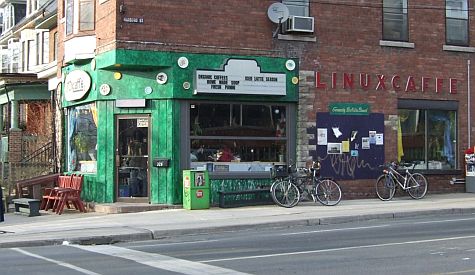 Continue reading “2007/04/10 Toronto Drupal Users Group meeting at the Linux Caffe“
Continue reading “2007/04/10 Toronto Drupal Users Group meeting at the Linux Caffe“
 Continue reading “2007/04/10 Toronto Drupal Users Group meeting at the Linux Caffe“
Continue reading “2007/04/10 Toronto Drupal Users Group meeting at the Linux Caffe“
(by David): Back in the Palisades days, IBM had a deal with Palm, so I managed to get an IBM Workpad, which was the first generation PDA. It was black-and-white, and didn’t do much, but since I would sync it to my laptop, it was helpful when I really didn’t want to boot my computer just to look up an address or phone number. I’m on my Thinkpad so much, that I really don’t need a lot of computing power. The old PDAs used to run 2 months on 2 AAA batteries, but then everyone went crazy for more features, so the PDAs had to start using rechargables … and they had to be rechanged everyday.
Of course, the old Workpad broke, so I got a second generation one from my job at Palisades. IBM stopped selling the Workpad, so when that one broke, I ended up buying a Palm IIIxe from Factory Direct. Under $100, with 8 MB of RAM, and still black-and-white screen on two AAA batteries.
Somehow, I lost the Palm IIIxe, and I’ve been working away from the desk at home, so I’ve been a bit annoyed at not having a PDA. I looked at what was new in PDAs, and decided to wait a few weeks … for the new Palm TX.
The Palm TX is, in effect, a Palm Tungsten T5 with Wifi access. This means a mobile browser! The other advance (from older Palms) is non-volatile memory. On old Palms, when the power ran out, everything on the PDA was lost. Now, when the battery runs out, at least I don’t have to reload everything!
The TX has been a nice luxury — it’s cheaper than the older models, but I could almost buy a cheap used laptop for that price, these days! Still, I’ve been listening to Podcasts recently, where the user interface has been discussed, so I’ve bee considering this my portable alternative to a Mac. (I’m still on Sony minidisc, no iPod!
Two annoyances with Palm, so far. One old application I used — Currency — a useful cross-exchange rate program that hasn’t been updated since 1999! — caused the TX to go into a loop. I had to reload the TX many times until I figured out that it’s a lost cause, and replace Currency with FXPilot from Oanda, which does the same thing, but in a user interface that requires two more taps. Secondly, I bought an SD card and then got Realplayer for Palm under the assumption that I could now play Realaudio (which is a super-compressed streaming format, which I normally have use Total Recorder to convert to MP3). Wrong! It turns out that Real doesn’t support Realplayer on mobile technologies! What are they thinking? (It’s possible to get WMA support — Microsoft’s version of streaming audio — on the Pocket PC format).
On the whole, I’ve been satisfied with the TX. It’s brand, brand new, and I bought a “multilingual” version over eBay, instead of going to a store, because this multilingual version comes with a multi-voltage adapter that I would otherwise have to pay $40 for!
Postscript: In packing for Finland, I discovered the Palm IIIxe in my travel luggage. I remember now …. I was taking notes at the conference in Florida, and already had all of my luggage packed. I just slipped the Palm into my travel luggage, because I tend to use the Palm when I’m on the road! Maybe Diana would like the Palm IIIxe.